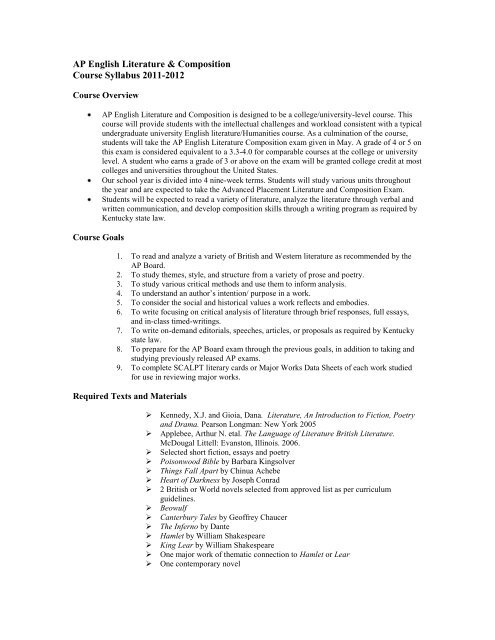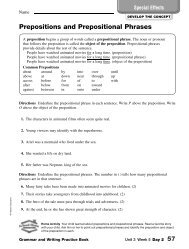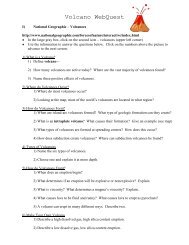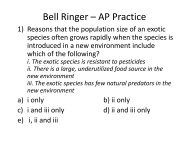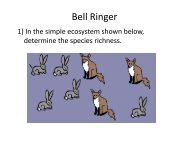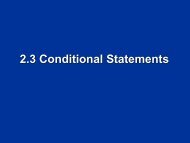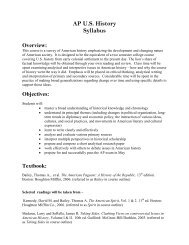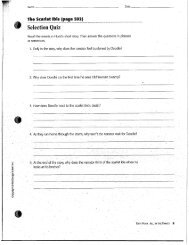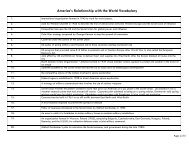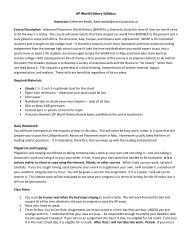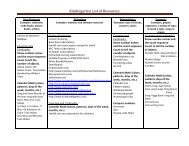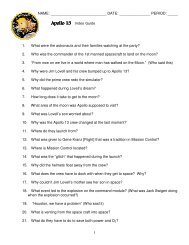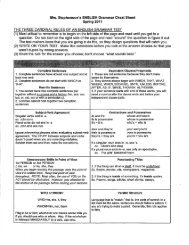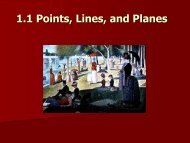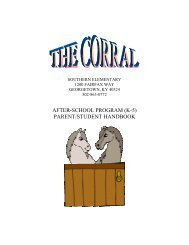AP English Literature & Composition - Scott County Schools
AP English Literature & Composition - Scott County Schools
AP English Literature & Composition - Scott County Schools
Create successful ePaper yourself
Turn your PDF publications into a flip-book with our unique Google optimized e-Paper software.
<strong>AP</strong> <strong>English</strong> <strong>Literature</strong> & <strong>Composition</strong><br />
Course Syllabus 2011-2012<br />
Course Overview<br />
Course Goals<br />
<strong>AP</strong> <strong>English</strong> <strong>Literature</strong> and <strong>Composition</strong> is designed to be a college/university-level course. This<br />
course will provide students with the intellectual challenges and workload consistent with a typical<br />
undergraduate university <strong>English</strong> literature/Humanities course. As a culmination of the course,<br />
students will take the <strong>AP</strong> <strong>English</strong> <strong>Literature</strong> <strong>Composition</strong> exam given in May. A grade of 4 or 5 on<br />
this exam is considered equivalent to a 3.3-4.0 for comparable courses at the college or university<br />
level. A student who earns a grade of 3 or above on the exam will be granted college credit at most<br />
colleges and universities throughout the United States.<br />
Our school year is divided into 4 nine-week terms. Students will study various units throughout<br />
the year and are expected to take the Advanced Placement <strong>Literature</strong> and <strong>Composition</strong> Exam.<br />
Students will be expected to read a variety of literature, analyze the literature through verbal and<br />
written communication, and develop composition skills through a writing program as required by<br />
Kentucky state law.<br />
1. To read and analyze a variety of British and Western literature as recommended by the<br />
<strong>AP</strong> Board.<br />
2. To study themes, style, and structure from a variety of prose and poetry.<br />
3. To study various critical methods and use them to inform analysis.<br />
4. To understand an author’s intention/ purpose in a work.<br />
5. To consider the social and historical values a work reflects and embodies.<br />
6. To write focusing on critical analysis of literature through brief responses, full essays,<br />
and in-class timed-writings.<br />
7. To write on-demand editorials, speeches, articles, or proposals as required by Kentucky<br />
state law.<br />
8. To prepare for the <strong>AP</strong> Board exam through the previous goals, in addition to taking and<br />
studying previously released <strong>AP</strong> exams.<br />
9. To complete SCALPT literary cards or Major Works Data Sheets of each work studied<br />
for use in reviewing major works.<br />
Required Texts and Materials<br />
‣ Kennedy, X.J. and Gioia, Dana. <strong>Literature</strong>, An Introduction to Fiction, Poetry<br />
and Drama. Pearson Longman: New York 2005<br />
‣ Applebee, Arthur N. etal. The Language of <strong>Literature</strong> British <strong>Literature</strong>.<br />
McDougal Littell: Evanston, Illinois. 2006.<br />
‣ Selected short fiction, essays and poetry<br />
‣ Poisonwood Bible by Barbara Kingsolver<br />
‣ Things Fall Apart by Chinua Achebe<br />
‣ Heart of Darkness by Joseph Conrad<br />
‣ 2 British or World novels selected from approved list as per curriculum<br />
guidelines.<br />
‣ Beowulf<br />
‣ Canterbury Tales by Geoffrey Chaucer<br />
‣ The Inferno by Dante<br />
‣ Hamlet by William Shakespeare<br />
‣ King Lear by William Shakespeare<br />
‣ One major work of thematic connection to Hamlet or Lear<br />
‣ One contemporary novel
Performance Tasks<br />
Summer Reading<br />
Reading and analyzing a variety of literature through discussion and written responses<br />
In-class timed writings using past <strong>AP</strong> prompts<br />
In- class multiple choice practice on poetry and prose passages using past <strong>AP</strong> prompts<br />
Teacher generated tests and quizzes over assigned material<br />
Literary analysis essays<br />
Weekly written poetry reflections/ analysis<br />
Research based inquiry related to authors, periods and critiques covering a variety of reading<br />
materials.<br />
Group performance activities such as fishbowl discussions, panel discussions, debate, poetry<br />
explications and presentation.<br />
Students are to read Poisonwood Bible by Barbara Kingsolver.<br />
Unit 1 – Short Fiction (4-5 weeks)<br />
Students will study the following:<br />
Critical approaches to literary analysis<br />
Close reading and grammar skills (syntax, diction, tone, structure, theme, etc.)<br />
Writing effective thesis statements<br />
Essay structure<br />
Texts included:<br />
‣ Poetry included in summer assignment<br />
‣ Selected short stories (Ex. - “The Yellow Wallpaper”, “The Lottery”, “The<br />
Crysanthemums”, “A&P”, “A Rose for Emily”, “The Jilting of Granny Weatherall”)<br />
‣ Selected excerpts of other works<br />
‣ Critical analyses of short fiction from noted authors<br />
Using the short fiction selections, students will learn to analyze fiction for meaning and style. Students will<br />
practice writing effective thesis statements in response to literature.<br />
Unit 2 – Expository/Persuasive Writing (1 ½ weeks)<br />
Students will study persuasive writing techniques and various forms of expository and persuasive writings,<br />
specifically as required by Kentucky State Standards Assessment. Forms such as editorials, articles,<br />
proposals, letters, and speeches will be studied through modeling and practice on-demand writing.<br />
Unit 3 –Thematic Unit -African Colonization (6 weeks)<br />
Students will discuss or research aspects of African Colonization for social and political background in<br />
order to better evaluate the themes and impact of these events on British and American thought- research<br />
may culminate in a choice of projects, either group or individual, requiring annotated bibliography and<br />
presentation or evaluations of short articles.<br />
Major Components<br />
1. Poisonwood Bible<br />
-Fishbowl Discussion (focus on cultural and historical context, character motivation, narrative<br />
voice, and theme)<br />
-In-class timed writing<br />
-Novel Exam<br />
2. Things Fall Apart<br />
-Research on African culture<br />
-Comparison Essay (Things Fall Apart and “The Second Coming”)<br />
3. Heart of Darkness<br />
-Guided Reading (focus on narrative voice, symbolism, and theme)<br />
-In-class timed writing (comparison/contrast of Heart of Darkness and Things Fall Apart)
Unit 4 – <strong>Composition</strong> & Grammar (2 weeks throughout year)<br />
Writing in accordance with the Kentucky Department of Education will be done. Mini-lessons will be<br />
conducted on idea development, structure, diction, tone, voice, thesis, effective paragraph writing, syntax,<br />
and grammar.<br />
Unit 5 – Novel/Play Major Work Study (4 ½ weeks)<br />
Students will read at least 2 major works during this unit. The focus will be on understanding the social and<br />
historical context of the works, as well as reading for major literary elements. Please note that while units 4<br />
and 5 have designated time limits, they actually will be intertwined over the course of 7 ½ weeks as to<br />
allow sufficient time for portfolio conferencing and feedback. From this unit, students will select at least<br />
one Victorian novel, one dystopian novel, and two other choices from an approved list taken from the<br />
<strong>English</strong> department curriculum guidelines which also meet the standards of literary merit appropriate for<br />
Advanced Placement.<br />
Dystopian Selections:<br />
Brave New World<br />
Aldous Huxley<br />
1984 George Orwell<br />
Approved Victorian Selections:<br />
Wuthering Heights<br />
Emily Bronte<br />
Tess of the D’Urbervilles<br />
Thomas Hardy<br />
Great Expectations<br />
Charles Dickens<br />
Middlemarch<br />
George Eliot<br />
Mayor of Casterbridge<br />
Thomas Hardy<br />
Pride and Prejudice<br />
Jane Austen<br />
Picture of Dorian Gray<br />
Oscar Wilde<br />
The Moonstone<br />
Wilkie Collins<br />
Sense and Sensibility<br />
Jane Austen<br />
Emma<br />
Jane Austen<br />
Other Selections:<br />
The Count of Monte Cristo<br />
Alexandre Dumas<br />
The Once and Future King<br />
T.H. White<br />
Les Miserables<br />
Victor Hugo<br />
Portrait of an Artist as a Young Man James Joyce<br />
Anna Karenina<br />
Leo Tolstoy<br />
War and Peace<br />
Leo Tolstoy<br />
Madam Bovary<br />
Gustave Flaubert<br />
Murder in the Cathedral<br />
T.S. Eliot<br />
Waiting for Godot<br />
Samuel Beckett<br />
Doctor Faustus<br />
Christopher Marlow<br />
The Importance of Being Earnest Oscar Wilde<br />
Assignments<br />
The following assignments may accompany the major works unit. Some assignments will be completed<br />
with all 4 selections, while others will be only for selected works.<br />
1. Research of historical and social context (for Victorian novel) – students will research the era in<br />
which the book was written and must cite a minimum of three sources. They must write two typed<br />
pages focusing on the daily life and class structure, the arts and culture, and the political issues of<br />
the time.<br />
2. Author study (for each work) – students will research author’s background and search for<br />
connections between author’s life and the work (whether it be in personal experiences, setting,<br />
characterization, plot lines, themes, etc.)<br />
3. Stylistic prose techniques – students will prepare a list of at least 10 powerful prose techniques<br />
from the work. Examples could be point of view, tone, diction, syntax, narrative pace, humor,<br />
satire, figurative language, imagery, structure, or irony. Students must define the term, cite the
example from the text, and provide a brief analysis of how the author uses the technique<br />
effectively.<br />
4. Exams – students will take exams over two of the selections to assess detailed reading.<br />
Unit VI – Poetry (4-5 weeks)<br />
During this unit, the major emphasis will be on the following:<br />
Poet’s lives ( so as to make connections to work)<br />
Historical and social context of poem through analysis of meaning, structure, and style<br />
Practice <strong>AP</strong> prompts – both multiple choice and timed writing essays<br />
Poets studied will be:<br />
W.H. Auden, Williams Blake, Lord Byron, Samuel Taylor Coleridge, T.S. Eliot, Seamus Heaney, Ben<br />
Jonson, John Keats, Andrew Marvell, John Milton, Alexander Pope, Percy Shelley, Alfred Lord<br />
Tennyson, Williams Wordsworth, Williams Butler Yeats, Billy Collins, Robert Frost, Emily<br />
Dickinson, Walt Whitman, Henry Wadsworth Longfellow,<br />
Strategies used include:<br />
TPCASST and DIDL sheets to break open a poem; class discussion of meaning, style and<br />
structure; research based analysis, review of critical approaches to poetry; personal response writing; whole<br />
class and group discussion.<br />
Unit VII – Survey of Anglo-Saxon & Medieval <strong>Literature</strong> (4 weeks)<br />
Students will study the historical, social, and political issues during the Anglo-Saxon and Medieval era.<br />
They will read major works of those periods, studying stylistic differences in the literature and the<br />
development of language over time.<br />
Major Focus<br />
Historical study and research related to the culture and political events that impact literature of the<br />
periods.<br />
Poetic forms (epic, ballads, elegies)<br />
Poetic techniques (rhyming couplets, caesura, kennings, terza rima, allusion, alliteration, meter)<br />
Satire<br />
Old <strong>English</strong> language<br />
Middle <strong>English</strong> language<br />
Major Works<br />
• Beowulf<br />
• Canterbury Tales<br />
• The Inferno<br />
Major Assignment Options<br />
1. Students will reflect on heroic qualities with a culminating “hero speech” about someone they<br />
consider to have heroic traits.<br />
2. Students will write and perform a parody of “modern society” emulating the style of Chaucer.<br />
3. Students will create a visual model of “their own hell” modeled after Dante’s portrayal of hell.<br />
4. Students will hold discussions (Fishbowl, inner-outer circle etc) in response to questions of theme,<br />
irony, symbolism, tragic elements, form as it reflects meaning, epic qualities etc.)<br />
5. Students will read critical analyses and respond to the author’s perspective on a poem.<br />
6. Students will write reader responses to a wide variety of works by the poets mentioned as well as<br />
others in order to become immersed in the genre throughout the year.<br />
Unit VIII – The Renaissance( 6 weeks)<br />
During this unit, students will study the historical and cultural aspect of the Renaissance period, as well as<br />
literary techniques of sonnets and tragedies. One work of thematic connections (from another period) will<br />
also be included.
Major Works<br />
Hamlet<br />
King Lear<br />
Oedipus Rex<br />
Major Assignments<br />
1. Fishbowl discussion (requiring students to share insights, ask questions, and interpret themes<br />
rather than just discuss plot).<br />
2. Hamlet sanity/insanity debate (requiring specific evidence gathering throughout play and<br />
culminating in a debate with guest judges)<br />
3. In class essays adapted from previous <strong>AP</strong> exams, teacher generated tests and quizzes, brief<br />
personal responses, and soliloquy analysis.<br />
Unit IX – <strong>AP</strong> Test Review (2 weeks)<br />
During these two weeks, students will review style analysis techniques, examine testing skills, examine a<br />
few major works, take practice tests, and analyze results from past <strong>AP</strong> exams.<br />
Unit X – Contemporary <strong>Literature</strong><br />
Students will read one novel by a contemporary author. The current selection is The Bean Trees by Barbara<br />
Kingsolver. Other possible works that could be used are In Country by Bobbie Ann Mason, The Coal<br />
Tattoo by Silas House, or Creeker by Linda <strong>Scott</strong> DeRosier or Ordinary People by Judith Guest. The major<br />
assessment for this will be class discussion (making connections between themes, characters, and setting).<br />
Students will also be required to keep a reading journal of insights (one page after each quarter of the<br />
book).<br />
Unit XI – End of Year Project Options<br />
Class Yearbook<br />
At the end of the year, after the <strong>AP</strong> exam, students create and publish a class book. The students are<br />
responsible for the entire project and plan it themselves. The only requirements are these:<br />
1. It must include an autobiographical page for each student with student information and a picture.<br />
2. Each student selects 1 or 2 pieces of his/her writings to publish in the book and student must<br />
include an explanation of the piece(s) selected.<br />
3. The book must have a title, cover, and table of contents.<br />
4. Every student gets a copy to keep.<br />
5. Students have a deadline and they begin their own planning and publishing.<br />
This is one of the most rewarding projects all year because the students invest so much of themselves into<br />
it. Every year students become more creative with developing their books to make them unique memorable<br />
keepsakes.<br />
Poetry Presentations<br />
Students will be presenting analytical poetry projects.


